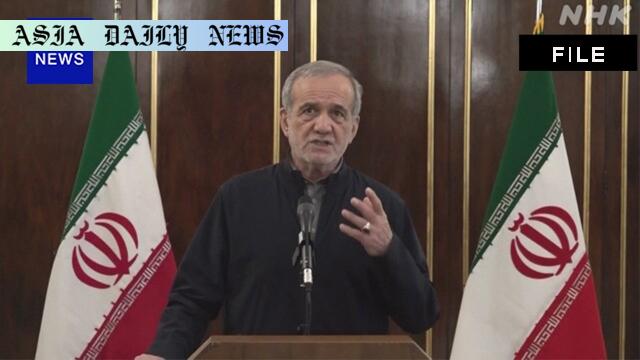Iran Nuclear Cooperation: Iran’s president announced the suspension of cooperation with the International Atomic Energy Agency (IAEA).
[object Object]
[object Object]
[object Object]
[object Object]

Introduction: A New Direction in Iran’s Nuclear Policies
On Wednesday, Iran’s President Masoud Pezeshkian announced a significant move to suspend existing cooperation with the International Atomic Energy Agency (IAEA). This decision follows a parliamentary demand for securing Iran’s sovereignty, nuclear facilities, and enrichment rights. Though details remain sparse, the suspension has set off alarm bells in the international community, which is scrutinizing the implications for the region’s stability, global nuclear safety, and ongoing diplomatic engagements.
The Parliamentary Context and Iran’s Stance
Last month, Iran’s parliament passed a motion urging the government to halt compliance with the watchdog until its stipulated conditions are met. These included recognition of Iran’s uranium enrichment activities and guarantees for its nuclear scientists’ safety. The decision stemmed from mounting domestic tensions and geopolitical pressures, emphasizing Iran’s steadfast commitment to asserting its sovereignty amid what it perceives as external interferences.
IAEA’s Findings and Increasing Tensions
In a previously released report, the IAEA outlined concerns about undeclared nuclear material uncovered at multiple Iranian locations. These findings date back to activities observed between 2019 and 2020 and suggest deviations from the declared program. While Iran contends these allegations are unfounded, accusations have resulted in heightened speculation over its ambitions. Tehran claims such reports provide an excuse for retaliatory actions from adversarial nations such as Israel, which has previously expressed sharp opposition to Iran’s nuclear aspirations.
Global Reactions: Raising the Alarm
The international community has expressed concern over this development. The suspension of cooperation would effectively bar IAEA inspectors from gaining access to Iranian nuclear facilities. Such an action could diminish transparency, fostering doubt over whether Tehran’s nuclear advancements align with peaceful objectives as stated under the Treaty on the Non-Proliferation of Nuclear Weapons (NPT). This uncertainty undermines global nuclear stability and raises the stakes for existing discussions between Iran, the United States, and other global powers.
Impact on Diplomatic Talks and Global Security
This suspension likely carries significant ramifications for the potential resumption of the Joint Comprehensive Plan of Action (JCPOA), commonly known as the Iran Nuclear Deal. The already fragile agreements may further deteriorate, making it increasingly challenging to ensure nuclear non-proliferation in the region. Alongside the fragility of Iran-U.S. diplomacy, the broader Middle East faces implications for increased insecurity and potential regional escalations.
Concluding Thoughts: Navigating an Uncertain Future
Iran’s decision to suspend cooperation with the IAEA casts a long shadow over global nuclear diplomacy. Whether this move represents a calculated political maneuver or escalates toward more profound consequences remains to be seen. The international community is now tasked with fostering unity to navigate what could be one of the most significant geopolitical challenges in recent years.
Commentary
The Complex Dynamics of Sovereignty and Global Accountability
The announcement by Iran to suspend cooperation with the IAEA raises essential questions about sovereignty versus collective security. While it’s understandable for nations to seek autonomy in their policies and actions, the sensitivity surrounding nuclear programs demands greater transparency. External interference into domestic affairs, as alleged by Iran, must be balanced against the shared global objective of preventing nuclear proliferation. The challenge is finding a middle ground where both sides feel their concerns are adequately addressed while reassurances over global safety are maintained.
Trust Deficit and Eroding Diplomatic Pathways
A critical aspect of this suspension relates to the erosion of trust among international stakeholders. Iran has long posed its position as being misunderstood or unfairly targeted and cites historical grievances to bolster its claims. However, credibility on the global stage heavily relies on adherence to multilateral agreements and cooperation with authoritative bodies like the IAEA. As skepticism grows, so does the difficulty in fostering diplomatic negotiations—a vital component to ensure the peaceful use of technology.
The Ripple Effects of Non-Compliance
When countries like Iran take unilateral actions, they risk setting precedents that other nations could replicate. In this case, the suspension not only impacts Iran’s immediate standing but also threatens the broader framework of international agreements such as the Treaty on the Non-Proliferation of Nuclear Weapons (NPT). The message sent by Tehran, intentional or not, could signal a weakening of international mechanisms designed to manage and regulate nuclear behaviors which could have devastating repercussions globally.


